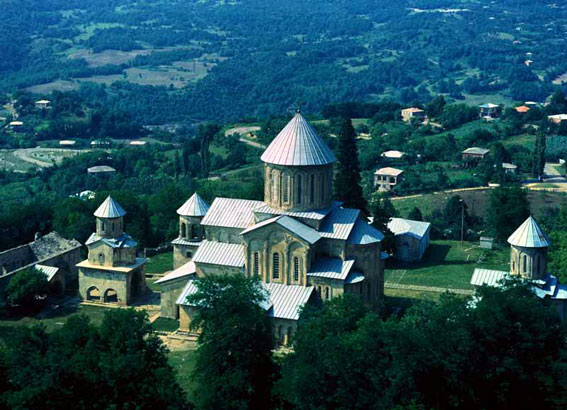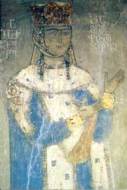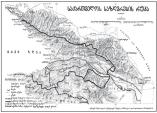● A Study of Ethnic Georgians’ Language in Turkey
Tbilisi Ilia Chavchavadze State University (Georgia)
Sociolinguistic Aspects of Language Maintenance:
A Study of Ethnic Georgians’ Language in Turkey
All kinds of states exist in the world in which policies and relationships are likely to be affected by the ethnic and language and internal cultural composition of the state.
People live together because of real or perceived similarities of many kinds: language, religion, race, social class, and so on.
Ethnic identity also figures in this list. Wardhaugh (1987:43) maintains: “At different times one or two characteristic, or some particular grouping of characteristics, becomes important. Today ethnicity is important, particularly when it is allied to one or more of the other characteristics, especially language, race, or religion”.
Fishman has observed (1977: 17):
“The notion of ethnicity reguires a central experiential concept of chord around which all others can be clustered. This central experience is here termed paternity, and deals with the recognition of putative biological origins and therefore, with the hereditary or descent-related “blood”, “bones”, “essence”, “mentality”, “genius”, “sensitivity”, “productivity” derived from the original putative ancestors of a collectivity and passed on from generation to generation in a bio-kinship sense”.
This “bio-kinship” may be real, mythical, or fictive but whatever it is, it is the key feature. This bio-kinship also manifests itself in a variety of ways: physical traits, gualities of “mind”, and of course, through culture and language.
De Vos(1975:9) states:
“An ethnic group is a self-percieved group of people who hold in common a set of traditions not shared by the others with whom they are in contact. Such traditions typically include “folk” religious beliefs and practices, language, a sense of historical continuity, and common ancestry or place of origin. The group’s actual history often trails off into legend and mythology, which includes some concept of and unbroken biological-genetic generational continuity, sometimes regarded as giving special charasteristics to the group”.
Ethnicity has both objective and subjective attributes. The objective ones are such matters as language, religion, cultural characteristics, perhaps certain institutional arrangments, and almost inevitably an historical tradition. The subjective ones have to do with feelings about identity and shared interests.
Based on the view expounded above is the view that the language connects the people with their ancestors. Language is the biggest part of the culture. People, ethnic group know who they are by the language they speak. It joins them to their history, their past, their people and their dreams.
The basic thesis is that language is a uniquely powerful instrument in unifying a population.
Although this paper is not a detail account of the history of ethnic Georgians of Turkey it is essentially an attempt to draw out the role of language in this group.
Traditionally, the Georgian people inhabited Georgia, as well as Turkey, Iran and Azerbaijan.
What is interesting about the ethnic Georgian’s situation is that – in contrast with that in every part of the world languages of small ethnic groups or minority languages are disappearing, or have already disappeared, being wiped out by major languages – it is for the ethnic Georgians maintained the language.
The people called Georgians are mother-tongue speakers of Georgian language. Due to some historical and political factors a fair number of Georgians for centures has been living in Turkey. It is surprisingly that Georgians the ethnic language they used had survived for so long and completely its original Georgian character.Georgian language still survives in Turkey inspite of centures of oppression.
It is hard to know precisely how many people speak the Georgian language. We are planning to research this in future times.
The majority of those who speak Georgian language live in Artvin, Shavshet district. They also live in urban and industrial areas: Istanbul, Ankara, Bursa, Inegol, Adapazar, Gonen, Izmit, Trabzon…
All ethnic Georgians in Turkey are bilingual, speaking both Turkish and Georgian languages.
Ethnic Georgians are known here primarily by their use of language and song. Georgian language serves as an identity marker here and like other traditional things (houses, cuisine, working tools …) identifies the people who belong to a certain group. Although many things behaviors can mark identity, language is the only one for ethnic Georgians that usually carries extensive cultural context; distinctive sounds uttered in speaking and songs.
The question to ask is: how they have been successful in retaining their language? Georgian language has no official standing, no social dominance in Turkey?
1. Perhaps the most important is use of language in the ethnic group as a whole. Georgian language is used as the vehicle of communication in the ethnic group as a whole.
2. Georgian language is transmitted to chindren, it is learned by children in a fair number of families. If a given language is no longer transmitted to the children of the ethnic group as a whole it my be considered dead. Georgian language did not cease to be used in families here.
3. The ethnic Georgians have not changed the teritory. They live in their traditional teritory (it was a part of Georgia before). They still occupies its traditional land, therefore geographical features have Georgian language names that reflect the ethnic Georgians connection to the region. There are historical castles, cathedrals, chapels in the villages which also have names rich in meaning and history for the ethnic Georgians.
It should be noted that language is alive as long as it survives in place names. Indeed officially the place names are Turkish now. But one part of Artvin, Shavshet district (Georgian – “Imerkhevi”) is home to a rich panorama of Georgian place names.
A language may leave traces of its earlier presence in the form of substratum, especially in the lexicon (Dimmendaal 1989:25; Sasse 1992:18). Place names of Georgian origin are found in every villiage (Shertuli, Sharabuli, Sinkoti, Chakvelta, Dasamobi, Brigalara, Davlati, Otklde, Svirevani, Djvariskhevi, Chikhis khevi, Bazgireti, Didkhani, Ziosi, Khevtsvrili, Daba, Ube, Chikhori, Tetraketi, Ardiastsminda, Libani, Tsqalsimeri, Sholtikhevi, Bzata, Tsetileti, Khokhlevi, Zakieti, Machkhateti, Manatba, Agara, Impkhrevli, Koklieti, Diobani, Iveti, Gamesheti, Davitieti, Parnukhi, Didmere, Rioleti, Gogieti, Gomta, Djvarebi, Chikhvta…) of Imerkhevi: Tskhratsqaro, Tsikaruli, Sachinke, Navakhtanguli, Shindnarevi, Khevi, Sanapote, Venakhsdzirai, Samebati, Tsqarotkhevi, Kvishnobebi, Tsiteladziri, Karchkhali, Mindieti, Tbati, Gaghmourienti, Sakrave, Utsqloperdi, Shisvelperdi, Melisakuntalai, Sakencho, Gharipirti, Didperdi, Eliatsminda, Nasakhlevi, Chitaiqana…(Sh. Putkaradze:1993, T. Putkaradze: 2007, N. Tsetskhladze: 2000).
These names embraces the land and the people as one. An ethnic group’s language is considered to be a very central part of their cultural heritage and ethnic identity and language survives in place names is one of the ways to maintain their heritage and identity in terms of language.
4. The plants, animals, mountains, rivers have Georgian names that suggest their local use.
5. The villiages of ethnic Georgians are home to many myths, legends, stories and tales that relate important points in the group’s history.
As Nancy C. Dorian mentions “These stories, so fundamental to a people’s sense of themselves, will be unavoidably stripped of a good deal of their original character if the language in which they were originally told is replaced by a different language. Other sorts of material with major cultural significance face the same stripping process: sacred chants, hero tales, genealogical recitations, core spiritual concepts framed in the heritage language of the group can be difficult or impossible to express with equal clarity or depth of meaning in another tongue” (Dorian, 1999:32).
6. It is important to point out ethnic group’s rural nature of residence, isolation of the community (Fishman 1964:52, 1972:126-127; Dorian 1973:413; Pawley 1991:7; Kane 1997:241; Krauss 2001:23). There is a distance from urban centres. The ethnic group in isolation from cities has a better chance of maintaining its language. When the community loses its isolation from the outside world, its language is influenced by the outside, other language.
7. One of the first thing that provides language maintenance there is a factor of concentracion, dispersion of speakers (Fishman 1972:126; Edwards 1992:50; Mesthire 1994; Bradley 1998:51, 54). An ethnic group with a dense population better preserves its language than a group of the same size, spread out over different territories. People who are scattered in many places reduces the opportunities to speak the language leading to its demise.
8. Lifeways of ethnic Georgians: ethnic Georgians retain its traditional way of life. An ethnic group – retaining traditional family structure – preserves its language better whereas adaptation to modern ways of life makes preserving the language more difficult.
9. Marriage patterns: intermarriage has not been common among Georgians. Intermarriage is often listed as a cause of language endangerment (Schmidt 1990:15; Zepeda and Hill 1991:138, 141; Dixon 1991:245; Campbell 1994:1963: Brezinger 1997:276; Crawford 1997:57; Kane 1997:241). Marriage between members of the same language group is more likely to contribute towards the presentation of the language concerned than a mixed marriage. The situation does not seem not to have been any mixed marriage here, but it has not been common among the ethnic Georgians.
According to ethnic Georgians in Turkey people, history and language are closely connected here. They know who are the by the language they speak. It joins them to their history and their past which is so full of struggles. Language is their culture. As Fishman cites: “most of the culture is in the language and is expressed in the language”.
Why do the ethnic Georgians save their language since they have no political, economic or global relevance? Because the value of traditional language is in their integrative, rather than instrumental, pragmatic or function (Dorian 1978:608; Rouchdy 1989:96; Spolsky 1995:179). Georgian language has a symbolic value, an integrative function in that it plays an important role in maintaining the group’s identity.

















Nino said
I am professor at Tbilisi state University. I teach Georgian as foreign language. I would like to have a contact with your Universiry
LikeLike
Isiah Calligan said
This post makes a lot of sense !
LikeLike
john said
Excellent stories, keep them coming 🙂 This is the first time i have commented, b¨´t i have been lurking for a although.
LikeLike
Tigran said
This article is working against georgians, because they don`t imagine what will happen to them, if they`ll not stop to confront against armenians. Georgians are historical, cultural nation, and they can`t have any relations with turks. It is truth, armenians and georgians during 3000 years had conflicts, but England and France had conflicts, too. Greeks and persians also were fighting against each other. But non of them were destroying each other with such cruelity as turks did. Civilized nations have their rules to fight, they never kill childs, woman, and never destroy culture. Georgians and armenians were and are brother nations, Bagradits, Zakarians, Orbelians, Queen Shushanik and iberian king Rhadamistus. Now some historians who are greatly payed by turks want to disrupt two historical civil nations. All that is created in Caucas, is created by armenians and georgians, they are the only real successors of this cultural heritage- descendants of Hayk and Kartlos. All other newcomers must know their place. Armenians and Georgians must base on their common history. Gas and oil soon will be displaced by other powers,- by intelect , by sense, by faith, by honesty, by culture. Georgians and Armenians have got these powers, thank God, otherwise we would have got only gas and oil. These are not empty words, God bless Armenia and Georgia!…
LikeLike